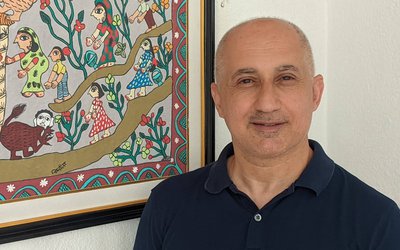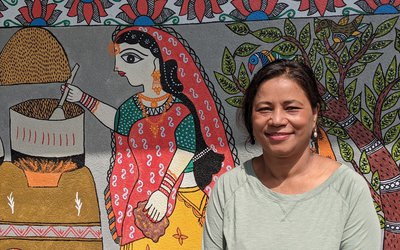
As a high level delegation including the Members of Parliament, journalists, and senior government officials from Finland visited Nepal, how do they view overall scenario?
The main purpose of the trip was to introduce the Finnish aid program in Nepal to them. That is why they travelled to some districts to see the programs. They were very impressed about the progress in rural water supply and sanitation projects as well as in the education and forestry projects.
As delegation also interacted with leaders of various political parties, civil society organizations and media, how do they view prolong political instability and ongoing constitution writing process?
They were briefed first by the Embassy about the political situation in Nepal and also the constitution writing process. Then the meetings followed. Since no one of them new Nepal much in advance they did not ask many questions. But some comments were related to the consensus as far the constitution writing is concerned.
Finland is one of the major countries supporting Nepal’s all round development. What is the state of bilateral relationship?
Bilateral relationship could not be better, there are no problems in that regard. But we should be able to expand our relations in trade and culture in the future. These areas need attention from the Embassy and Nepali side as well.
After the visit of high level delegation from Finland, what are going to be future priority areas for Finland in Nepal?
Priority areas will remain the same, rural water supply and sanitation, education and forestry. These areas have been agreed between Finland and your Finance Ministry.
Having observing all the activities in Nepal, how do you see the current constitution writing process in Nepal?
Constitution writing has been a long process since it started already in 2008. In 2012, the Constituent Assembly was dissolved and new elections took place. Thinking that the process has been going on 6 years now, I must confess that I am becoming slightly disappointed with the process knowing that people in Nepal really expect the new constitution to be agreed.
As political leaders have been briefing ambassadors based in Kathmandu, how do you see the move?
Yes, the ruling parties briefed the Ambassadors recently but I missed the briefing since the delegation was in the country. Now I read from the newspapers that the opposition is also going to brief us. It is good the get information, I appreciate that. And briefings are useful to us if they are concentrating on the essentials. But blaming the others is never fruitful, hopefully this can be avoided.
What is the state of constitution writing in your view?
I mentioned before that the Finnish delegation was asking why consensus is expected as regards the writing the new constitution. I fully agree that consensus would be ideal when the new inclusive constitution is agreed. That should be the priority option definitely, inclusive constitution by consensus. But it seems that the parties cannot reach the consensus in the most essential parts of the constitution. This means that if the consensus is required there will not be a new constitution. So the decision makers in Nepal will probably consider the voting process and decisions by 2/3 majority if the situation remains like this. At least to me this looks a logical and only possible next step if the country wants to have a new constitution. In Finland we have always a coalition Government and a strong opposition. Most of the decisions are made by voting and people understand that the majority can decide in the democracy. So voting option, if no consensus can be reached, might be the next step. We will see what the decision makers will finally decide.
Finland has shown that even empowerment is possible even in unitary states. How do you see the current debate in Nepal on Federalism?
This is totally Nepal´s internal issue, federalism or not. And we in Finland do not have experience as far as federalism is concerned. In our system the municipalities are very independent and have many responsibilities like health care, education, roads and other infrastructure. In order to do all this municipalities have the right to tax people and of course local elections are held every four years. This system functions well and the results are good.
But I would like to add that whatever kind of constitution Nepal will finally choose the decision makers should be aware about all the implications the new system will bring with it. I have read about the plans to establish an ethnic based federalism in Nepal. What does this exactly mean, I do not know, that should be clarified to everybody.
Do you think Federalism is panacea for all the ills?
I think federalism or any other form of constitution cannot not be panacea for all the ills. There is no perfect system available, which solves all the problems. Sometimes I however hear people talking like they would believe that federalism will solve all the problems, especially the problems related to minorities. I do not believe it can but think that most of the people in Nepal would benefit of a wise inclusive constitution. Hopefully this will be the case in Nepal.
In the context of Finland’s private sector investment in Telecom through NCELL, how do you see the possibility of attracting Finland’s private investment in Nepal?
Finland owns about 8% of the shares in TeliaSonera, which again owns Ncell. Ncell is a bright example of a foreign investor who has been successful and also useful for the citizens in Nepal. Future investors might be there also from Finland but this requires less bureaucracy, better infrastructure and less involvement of the non essential actors in business. And one should also understand that business is not aid, the shareholders expect that they gain from the business and this means that the profits of the foreign investors can be freely repatriated.
You have been heading the Finnish Embassy in Kathmandu now twice and lived in the country almost seven years. What is your impression, what kind of future Nepal has?
Yes, for the first time I was working here 2000-2004 and now again since September 2011. While I was away, Nepal changed a lot when the peace agreement was signed, the country became a republic and the political situation stabilized. I see three areas which will be the backbones of Nepal´s economy: agriculture, tourism and especially energy. Agriculture and tourism already benefit the country very much but in the energy sector much more can be done. You have enormous hydropower resources which can be developed. If this will be done, Nepal can be a major energy supplier in the region and generate a lot of funds by selling it. The present power supply situation is not beneficial to anybody so prompt actions as regards hydro power are needed.
The future of Nepal also lies in people themselves. I believe the friendly and smiling people of Nepal brought me back here and I have never regretted my comeback. I wish all the best to the Nepal were the people have never lost their confidence in the country despite very difficult times recently.
- TANAHU HYDROPOWER PROEJCT: A Significant Achievement
- Apr 15, 2024
- AMBASSADOR HANAN GODAR: Sharing Pain With A Nepali Family
- Mar 30, 2024
- VISIT OF KfW AND EIB TO NEPAL : Mission Matters
- Mar 25, 2024
- NEPAL BRITAIN SOCIETY: Pratima Pande's Leadership
- Mar 24, 2024
- NEPAL ARMY DAY: Time To Recall Glory
- Mar 15, 2024
















